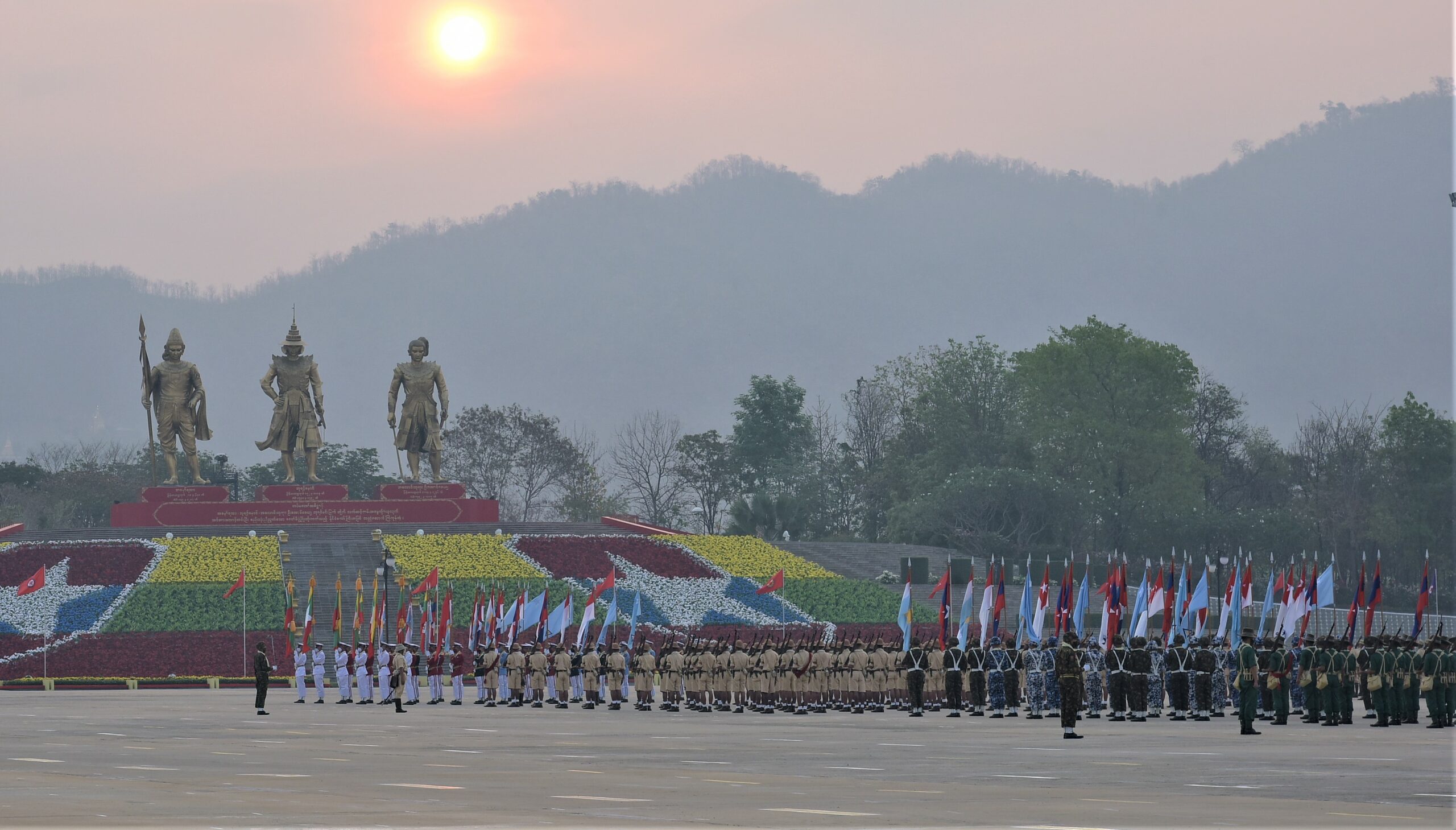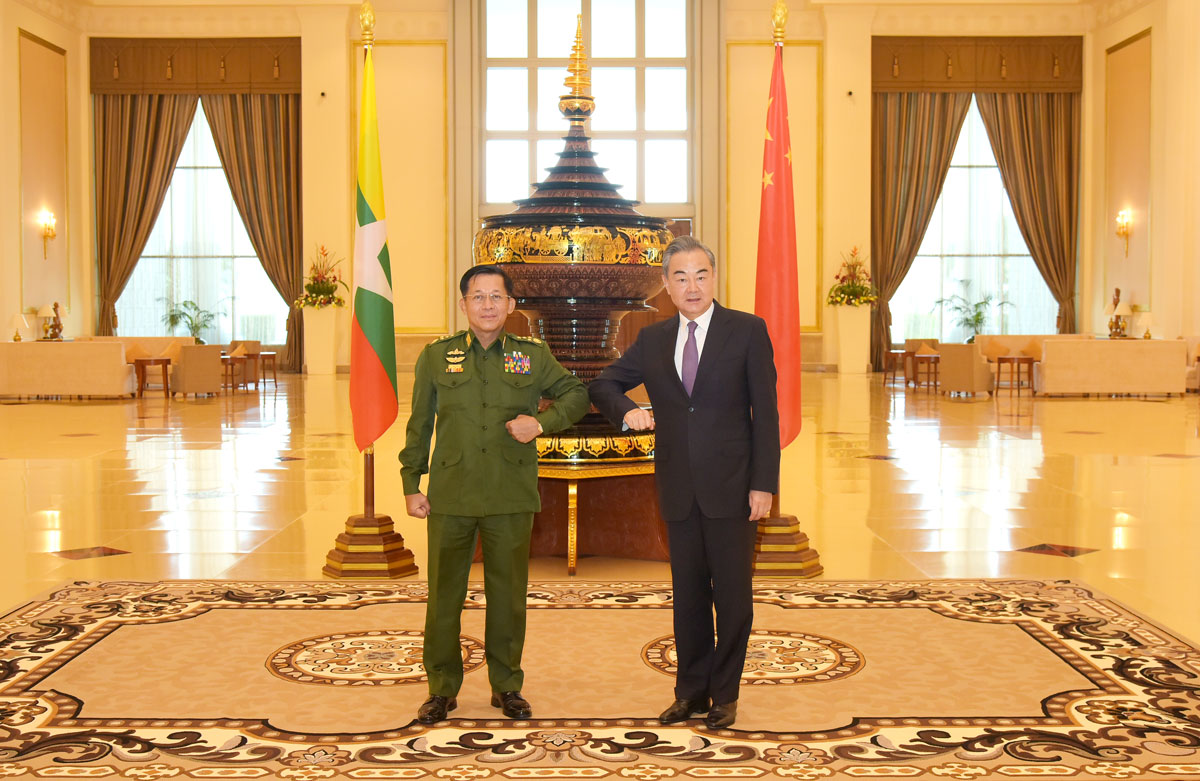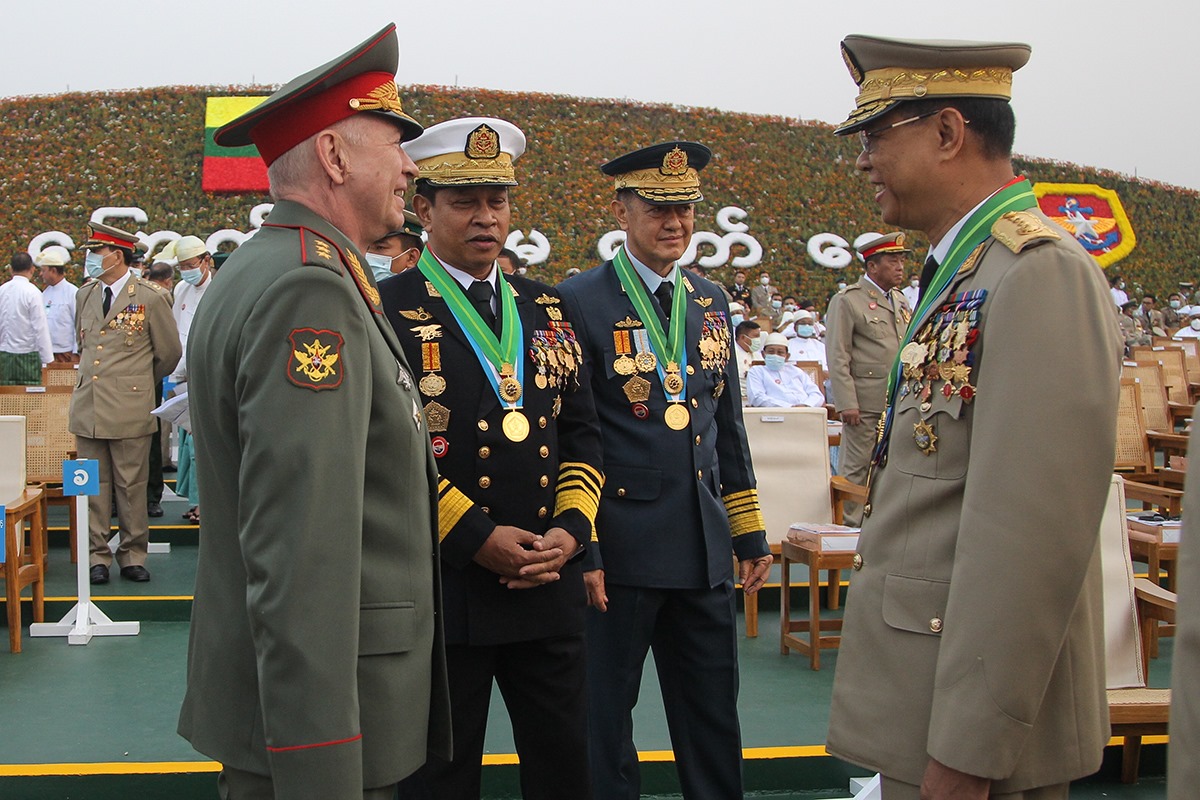As the Tatmadaw, Myanmar’s military, appears to be consolidating its grip on power, at least in the capital Naypyitaw, the debate over whether sanctions or engagement would be the best way to influence the generals has once again begun. There is, however, a simple answer to that question: neither is effective. Myanmar’s military rulers have always had their own agenda and don’t listen to people outside their own inner circle, regardless of what outsiders say or do. Attempts to understand the Tatmadaw by using as yardsticks the standards of modern Western militaries such as conventional command structures, promotions, equipment, orders of battle and deployment is equally fruitless.
The way the Tatmadaw works and functions can best be described as feudal and deeply rooted in traditional authoritarian values where the king was God. The supreme ruler demands and rewards loyalty and disowns and punishes those who dare to be different—and this is the system that was introduced by General Ne Win when he built up the Tatmadaw in the 1950s and created a state within a state, which in 1962 seized absolute power.
Ne Win stepped aside in 1989 and died in 2002 but the system lived on under Senior General Than Shwe, supreme ruler from 1992 to 2011. Than Shwe even changed the stated purpose of celebrating March 27, which in the past was called Resistance Day and meant to commemorate the day in 1945 when the Myanmar military, armed and equipped by the Japanese, turned against their former masters. Now, in the new, monumental capital Naypyitaw created by Than Shwe, there stands an enormous statue of the three main warrior kings in Myanmar history: Anawratha, Bayinnaung and Alaungpaya. Tributes to them and their virtues have replaced references to the anti-Japanese struggle, which may still be mentioned but only in passing.

But he is now 88 years old, has been hospitalized with COVID-19 and may not be around for much longer. That means that Myanmar right now is at a crossroads. Although Than Shwe retired from active duties after the 2010 election, he has remained a father figure for the military and when he is gone there is no obvious candidate for the role as the next King of the Tatmadaw.
The new junta leader, Senior General Min Aung Hlaing, is perceived by many as weak, and lacks charisma as well as leadership qualities. As a Yangon-based Myanmar analyst put it: “He doesn’t have the political stature of General Ne Win, the military manpower of General Than Shwe or the wiliness of both.” The future of military rule is therefore up for debate and that is where the question of sanctions versus engagement comes into the picture.
Sanctions and boycotts serve a purpose when it comes to rallying support for Myanmar’s democratic forces, which is important in order to keep the movement alive and prepare for possible future scenarios, but recent history shows that such measures have so far had zero impact on how the Tatmadaw as an institution acts and thinks. The views of those in the West who advocate engagement actually reflect what amounts to a blatant neo-colonial attitude or, as I wrote in The Irrawaddy on June 11, 2015, words to the effect of: “We have to go and tell those funny little brown fellows how to run their country, and, because we are big and clever white guys, surely they will listen to us.” It is, however, easy to image what the generals’ reaction is when they receive those Western proponents of engagement: “Those myaukpyu [white monkeys] are sort of amusing. But they are not very clever. So let’s use them.” Or words to that effect.
The third way, some Western diplomats and academics argue, is to apply a carrot-and-a-stick policy with punishments such as sanctions when the Tatmadaw behaves badly, and rewards in the form of aid and investment if the generals take some positive steps such as allowing more openness and demonstrate a willingness to negotiate a peaceful solution to the country’s decades-long civil wars. But, as one analyst put it: “That would work only if you are dealing with a donkey or a rabbit.” Josef Silverstein, a renowned Myanmar scholar who died on June 29 this year, once said: “If you offer them [the generals] a carrot, they will just eat it and ask for another one.”
Proponents of engagement have always underestimated the manipulative skills of the Tatmadaw and failed to realize that using military officers as intermediaries in the belief that their Myanmar counterparts would be more willing to listen to them than to civilians does not work. This was clearly demonstrated when Vice-Admiral David Johnston, vice chief of the Australian Defense Force, rang Vice-Senior General Soe Win, number two in the junta, or State Administration Council (SAC), to press for the release of Sean Turnell, an Australian academic and economic adviser to Daw Aung San Suu Kyi’s ousted government who was detained after the coup. Johnston also said that he urged the Tatmadaw not to use force against the protesters who were then filling the streets of Yangon and practically every city, town and major village in the country. But in Myanmar’s military-controlled media, the talk was described as a friendly discussion between two equals, thus appearing to be an endorsement of the coup.
When the European Union’s military chief of staff, Vice-Admiral Hervé Bléjean, called on Soe Win on March 9 to urge the Tatmadaw to stop all violence and release the country’s democratically elected leaders, the official media reported that they had discussed the SAC’s efforts to establish “community peace and the rule of law.” Myanmar analyst Ye Myo Hein pointed out succinctly in The Irrawaddy on Aug. 13: “Constructive engagement with the military by Western democracies did not transform the military into a professional organization, but instead and inadvertently emboldened and legitimized its leadership to do whatever they wished.”
Calls for engagement can also be outright distasteful and lacking in respect for the victims of the Tatmadaw. Erik Solheim, a Norwegian politician and former development minister who became a controversial figure when he unsuccessfully tried to mediate in the Tamil-Sinhalese conflict in Sri Lanka, wrote in the Norwegian journal Bistandsaktuellt on March 15 that the best way to honor Kyal Sin or “the Angel”, a 19-year-old demonstrator in Mandalay who was shot and killed by a sniper, would be through engagement and investment. Solheim asserted that the Norwegian telecom giant “Telenor is more important than the [UN] Security Council.” That, of course, was before Telenor in July sold all its businesses to a Lebanese company because it was too difficult to operate in SAC-ruled Myanmar. Telenor’s Sigve Brekke told Reuters after the pull-out: “There are three reasons why we think a sale is necessary: it is the safety of our employees, but also the regulatory conditions and also that there is good compliance.”
Sanctions, smart or otherwise, will remain ineffective for two major reasons. The first, which is also mostly overlooked, is the size of Myanmar’s parallel, or greyish-black, economy, which does not show up in any official statistics, and then the fact that countries such as China, Russia, Thailand, India, Malaysia, Vietnam and Singapore—Myanmar’s main trading partners—are happy to continue dealing with whoever is in power in Naypyitaw. Actually, most of them would prefer to deal with a military-run Myanmar than a democratic, transparent and accountable system where the authorities may have the audacity to clamp down on corruption and other malpractices.
Chinese Foreign Minister Wang Yi said in a speech at a forum at Tsinghua University on July 3 that the international community should refrain from imposing sanctions on the SAC, branding such actions as “inappropriate intervention.” Russia, another SAC ally, said as early as April 6 that sanctions against the SAC were futile and extremely dangerous. “In fact, such a line contributes to pitting the sides against each other and, ultimately, pushes the people of Myanmar towards a full-scale civil conflict,” the Russian Foreign Ministry said, as quoted by the Interfax news agency and reported by Reuters.

Russia and China, both permanent members of the UN Security Council, have consistently vetoed any attempt by other members to get the world body to take action against the SAC. China was also for years the Tatmadaw’s main source for military hardware and Myanmar has long been a buyer of Russian fighter jets, helicopters, drones and anti-aircraft missile systems.
And then there is the underground economy, which has kept Myanmar alive throughout rigid socialist policies before 1988 and sanctions and boycotts after that and until the West changed its policies in the aftermath of the 2010 election and the formation of a quasi-civilian government led by ex-General Thein Sein. Drugs, precious stones, timber, antiques and other artifacts have always been smuggled out of the country while assorted consumer goods have traveled in the other direction from countries such as China, India, Thailand and Singapore. The exact value of this informal—and illegal—trade is not known but runs into millions if not billions of dollars.

With an inadequate and largely untrustworthy banking system, many people in Myanmar prefer to utilize the services of dealers in what is called “hundies”, which in the Indian Subcontinent and the Middle East is known as “hawala”. Through this system, money is transferred via a network of private brokers, leaving no paper trail that any authorities can track down and follow. In short, Myanmar will, as it always has done, survive another round of punitive measures imposed by the West.
All that does not mean that change is never going to come to Myanmar—but it would have to come from within the Tatmadaw. And even the officer corps must realize through their Buddhist belief in anicca that nothing is permanent.
The possibility of splits within the military is usually dismissed by most foreign observers as unlikely because of the remarkable cohesion among officers that exists in the officer corps and their loyalty towards the supreme leader. While that is correct, Australian Myanmar expert Andrew Selth pointed out in a Feb. 19 article for the Lowy Institute, a Sydney-based think tank, that the highly unpopular coup will test the loyalty of military and police officers. “Times have changed and the latest generation of men in the security forces has grown up in a different environment than its predecessors…it would be a mistake to assume that they are just a mindless mass prepared to do whatever they are told,” Selth wrote. Even more important—and crucial for Myanmar’s future—would be what happens after the death of Senior General and Tatmadaw King Than Shwe.
Many pundits predicted that Myanmar, and the Tatmadaw, would change after the demise of Gen. Ne Win. But that did not happen. After an interregnum with the almost farcical junta leader General Saw Maung, a new strongman emerged. That may happen this time as well and it is highly unlikely that he will be more democratically minded than his predecessors. On the contrary, if Min Aung Hlaing were to be replaced because of his weaknesses, the new King could be even more savage and barbarous. But, on the contrary, if no person with strength and omnipotent stature is to be found, it would open a Pandora’s box of possibilities that could lead to unimaginable chaos and mayhem. And that is the grim legacy of the system Gen. Ne Win laid the foundations for—and which has prevailed since the military takeover in 1962.
Bertil Lintner is a Swedish journalist, author and strategic consultant who has been writing about Asia for nearly four decades.
You may also like these stories:
COVID-19 Hits Myanmar Refugees in Thai IDP Camps
Myanmar Military’s Superior Size Means Less When the People Are United Against it
Myanmar Junta Continues to Detain Journalists
















